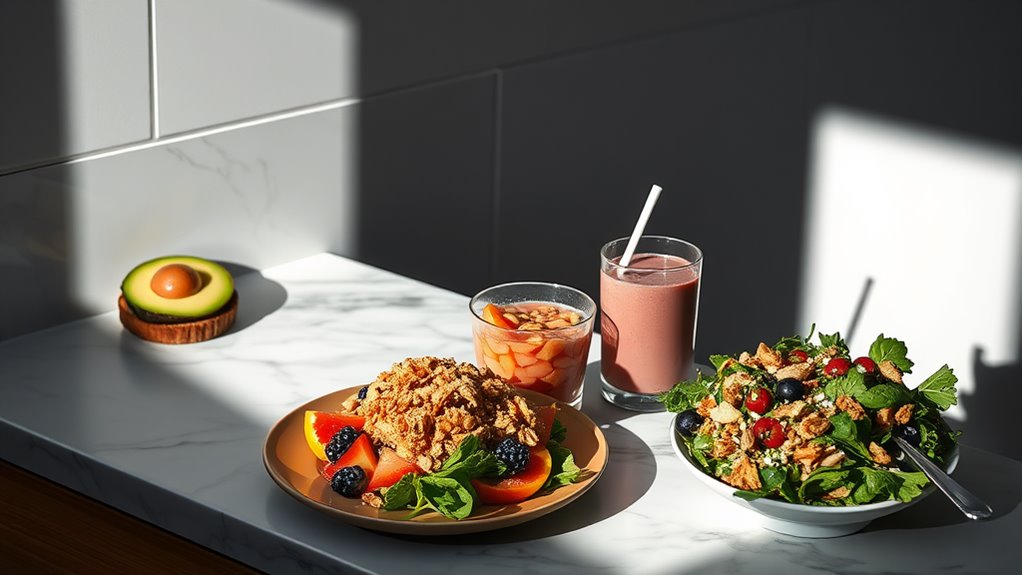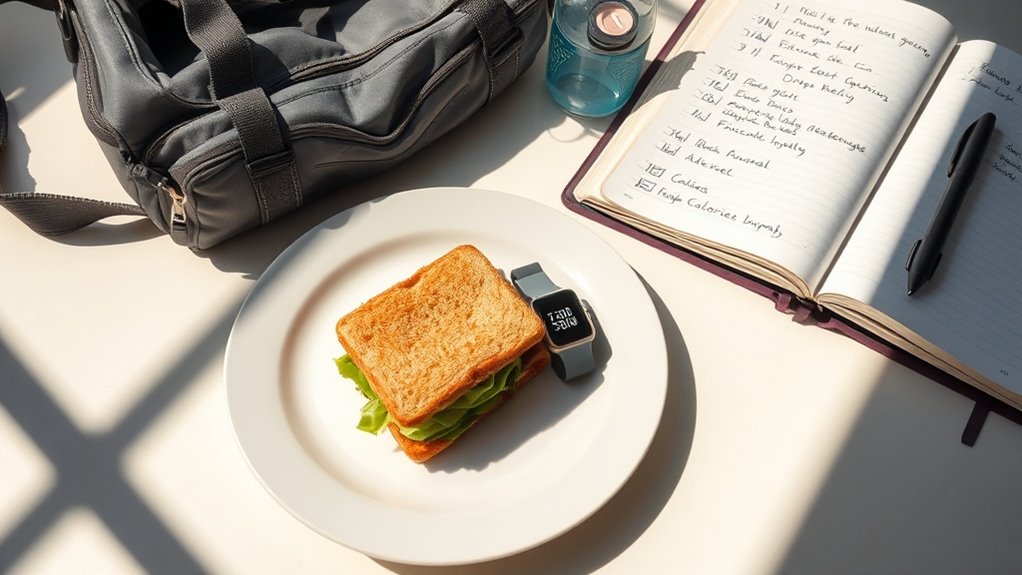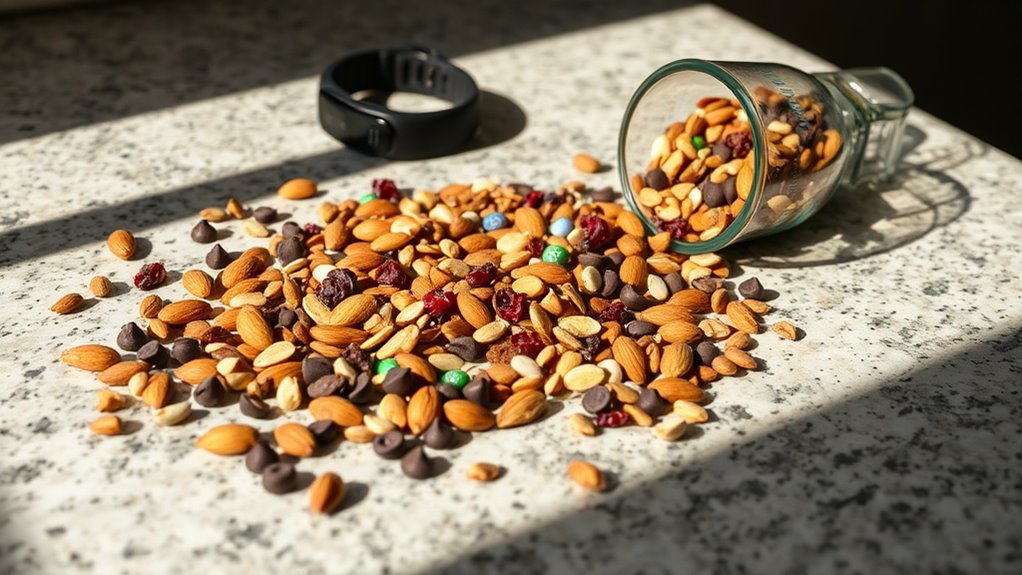These ‘Healthy’ Foods Are Secretly Stalling Your Weight Loss
Did you know that nearly 70% of consumers believe granola bars are a healthy snack option? However, many of these products contain hidden sugars and fats that can sabotage your weight loss efforts. It’s not just granola bars; seemingly healthy foods like flavored yogurts and high-calorie salad dressings often contribute to unwanted weight gain. Understanding the truth about these foods can significantly impact your progress. Are you ready to uncover what’s really holding you back?
Key Takeaways
- Many granola bars are loaded with added sugars, making them comparable to candy and hindering fat loss efforts.
- Popular salad dressings like ranch and Caesar can add significant calories without providing nutritional benefits.
- Refined carbs, such as white bread and sugary cereals, lead to blood sugar spikes and increased cravings, undermining weight loss.
- Flavored yogurts often hide excessive added sugars, making healthy choices misleading without careful label checking.
- Nuts and seeds can be high in calories; portion control is essential to prevent unintended weight gain.
The Truth About Granola Bars
Have you ever checked the nutrition label on your favorite granola bar? You might be surprised to find that many contain added sugars and unhealthy fats, making them foods that stall fat loss.
While marketed as healthy, some bars can have as much sugar as a candy bar, which spikes insulin and promotes fat storage. Additionally, their high-calorie density can lead you to underestimate your intake. Many bars contain more sugar than candy bars, which makes it crucial to be vigilant about what you consume.
Instead of reaching for a granola bar, consider whole foods like fruits or nuts that provide essential nutrients without the hidden sugars.
Making informed choices can help you stay on track with your weight loss goals.
Misleading Salad Dressings
Many store-bought salad dressings are deceptively unhealthy, hiding a multitude of calories and sugars behind their fresh, green labels. When you’re trying to lose weight, these can quickly sabotage your efforts. Here’s a quick comparison of popular dressings:
| Dressing | Calories per 2 tbsp | Sugar per 2 tbsp |
|---|---|---|
| Ranch | 145 | 1g |
| Caesar | 150 | 0g |
| Balsamic Vinaigrette | 80 | 2g |
| Thousand Island | 120 | 3g |
| Honey Mustard | 110 | 6g |
Choose wisely and consider making your own! Additionally, many dressings contain hidden sugars that can contribute to excessive calorie consumption.
Whole Grains vs. Refined Carbs
While you might think all carbohydrates are created equal, the distinction between whole grains and refined carbs can significantly impact your weight loss journey.
Whole grains provide essential nutrients and fiber, helping you feel full longer. In contrast, refined carbs can spike your blood sugar and lead to cravings. Consuming refined carbohydrates can lead to quick energy bursts followed by crashes and increased cravings.
Here’s what to look out for:
- Brown rice vs. white rice
- Whole wheat bread vs. white bread
- Oats vs. sugary cereals
- Quinoa vs. pasta
- Barley vs. rice cakes
Choosing whole grains over refined options can support your weight loss goals while keeping your energy levels steady. Make the switch today!
The Hidden Sugars in Yogurt
Are you aware that seemingly healthy yogurt can often be loaded with hidden sugars?
Many flavored yogurts contain excessive amounts of added sugars, sometimes exceeding 20 grams per serving. This can sabotage your weight loss efforts.
Even brands labeled “low-fat” or “fruit-on-the-bottom” can be misleading, as companies often compensate for flavor loss with sugar.
To make smarter choices, opt for plain Greek yogurt, which typically has less sugar and more protein.
You can sweeten it naturally with fresh fruit or a drizzle of honey.
Always check the nutrition label to stay informed and avoid unnecessary sugar intake. Additionally, be cautious of flavored yogurts that may not provide lasting satisfaction.
The Caloric Density of Nuts and Seeds
Nuts and seeds can be a nutritious addition to your diet, but their caloric density can pose a challenge for weight loss.
While they’re packed with healthy fats, protein, and fiber, it’s easy to overindulge. Keep these points in mind:
- A small handful can pack over 200 calories.
- They’re often consumed mindlessly as snacks.
- Portion control is crucial; a tablespoon can suffice.
- Check serving sizes to avoid hidden calorie overload.
- They can contribute to weight gain if eaten excessively.
Additionally, awareness of caloric intake is essential to ensure that these nutrient-dense foods support your weight loss efforts without hindering progress.
Moderation is key; enjoying nuts and seeds in controlled amounts can help you maintain your weight loss goals effectively.





